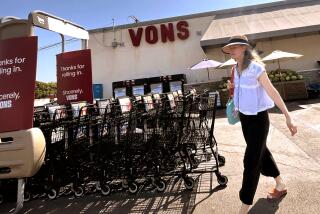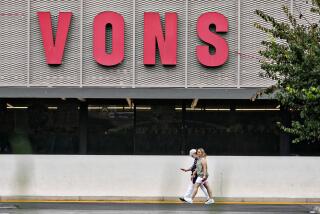Vons Cuts Back 24-Hour Operations at Some Stores
Less than a year after beginning around-the-clock operation of its supermarkets to attract hungry insomniacs, Vons has quietly cut back hours at 15 of its 350 stores because of poor sales.
“We still have a firm commitment to operating 24-hour stores,” said Mary McAboy, director of corporate communications at Vons. “We’ve just taken this step . . . at some of our stores that have experienced falling volume.” McAboy added that operating hours at two more Vons stores were shortened to comply with requests from local government officials to curtail hours to comply with curfew ordinances or other laws.
Vons was among the first major supermarket operators to institute the 24-hour policy chainwide when it announced last March that its stores--located in Southern California and Nevada--would stay open around the clock. Most Ralphs and many Lucky Stores also operate all night.
Vons said its decision to go to around-the-clock operation was in response to competition from 24-hour convenience stores and to the changing life styles of consumers. Competition has prompted supermarkets to toy with 24-hour operations for years, industry experts said, with varying amounts of success.
Neil Z. Stern, director of retail strategy at McMillan-Doolittle, a Chicago-based consulting firm, said, “24-hour stores have really been cyclical in the industry. It’s big for a couple of years then tapers off afterward--usually because the economics don’t pay off.”
Officials of Ralphs, the other major chain that went to around-the-clock operation last March, said Monday that they have not altered the policy at any of the 126 Ralphs stores that have been open 24 hours a day during the past year. Officials of Lucky, which has been experimenting with 24-hour operations, could not be reached for comment.
Despite the mixed success of operating around the clock, experts say keeping a store open all the time is a comparatively inexpensive and simple undertaking.
“There are extra costs but not tremendous costs,” since stores must keep staff on hand in the wee hours of the night to clean and restock the facilities, Stern said.
But he added that stores have more success with 24-hour operation in busy urban areas than in bedroom communities, where people tend not to go back out once they are home.
More to Read
Inside the business of entertainment
The Wide Shot brings you news, analysis and insights on everything from streaming wars to production — and what it all means for the future.
You may occasionally receive promotional content from the Los Angeles Times.










